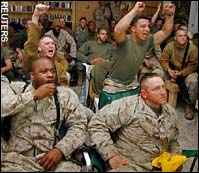Entered into the database on Sunday, February 12th, 2006 @ 16:04:53 MST

The airbase at al-Asad is the biggest marine camp in western Anbar province. It is in the midst of the most rebellious region in Iraq, where thousands of insurgents have been killed in a series of operations over the past year.
But get "inside the wire" and this stretch of desert increasingly resembles a slice of US suburbia rather than the front line in a war zone.
Its restaurants include a Subway and a fast food pizza shop. There is a coffee shop, football pitch and even a swimming pool.
A cinema shows the latest films while the camp's main recreational centre offers special dance nights - hip hop on Friday, salsa on Saturday and country and western on Sunday.
There is even a Hertz car rental providing saloons with bullet-proof windows for those wanting to cross the base in something more comfortable than a military Humvee.
For as the news from Washington focuses on troop withdrawals, the US military is beginning to implement at immense cost the next stage in its policy for Iraq. And it is one likely to disappoint those hoping for a quick exit of all foreign troops.
Last summer reports began to emerge that plans had been drawn up to create four "super-bases", giant camps that would house tens of thousands of US soldiers similar to other sprawling military facilities around the world.
The intention was for the newly trained and equipped Iraqi army to gradually take over the majority of combat operations, allowing a proportion of the 138,000 US troops to depart. Those remaining would provide back-up from their new centres of operation when requested.
That hand-over has already begun with a dozen smaller bases evacuated in recent weeks. In total 100 are scheduled to be transferred to the Iraqi government this year.
Although no official confirmation will be given of where super-bases will be located, at al-Asad there is every impression that one is in the process of being created.
The guidelines under which reporters are allowed to visit military facilities prohibit any mention of their location, size or number of troops.
But it breaks no rules to say this is a place so extensive it has two bus routes inside and the sight of workers constructing new billets for more troops is common.
Last month, red "Stop" signs - the ubiquitous feature of American street furniture - went up at all road junctions.
Senior members of the governing Shia parties have complained that they show American plans for a long-term presence in their country.
Sunni members of the Iraqi Islamic Party regard them as evidence of an open-ended "occupation", a charge denied by US officials who insist the bases are another step in an eventual withdrawal.
But even the marines based at al-Asad are sceptical about how quickly that step will be completed.
The Iraqi army is considered "at least" a year from being able to take the fight to the insurgents.
Senior officers point out that when the main army base near Tikrit was handed over to Iraqi forces, a transfer widely touted by Washington as evidence of Iraq's growing ability to stand alone, it was looted bare within weeks by the very Iraqi units who were meant to protect it.
Above all there is the knowledge gained through grim experience that predictions of what Iraq will be like in the immediate future are almost always wrong.
Col H R McMaster, the commander of troops in Tal Afar and the US senior officer whose counter-insurgency tactics have been singled out for praise in Washington and London, was asked recently what he thought the next 12 months would hold for Iraqis.
He declined to speculate. "Anyone who claims to understand what is happening in Iraq does not understand it," he answered.
Servicemen, meanwhile, confidently predict that they will be rotating through the base for at least a decade.
One sergeant pointed out that at least they will be able to buy a proper cup of coffee.